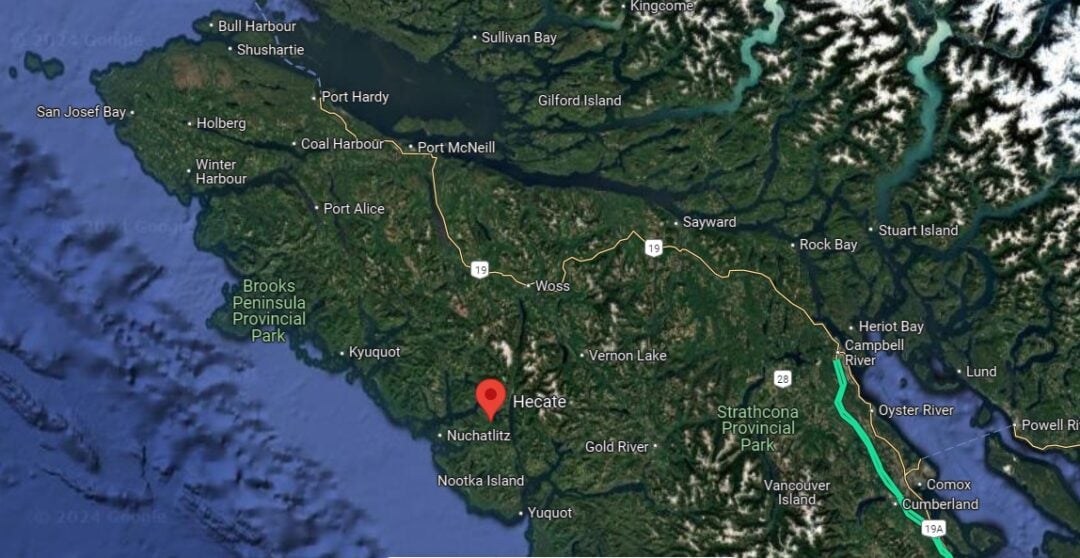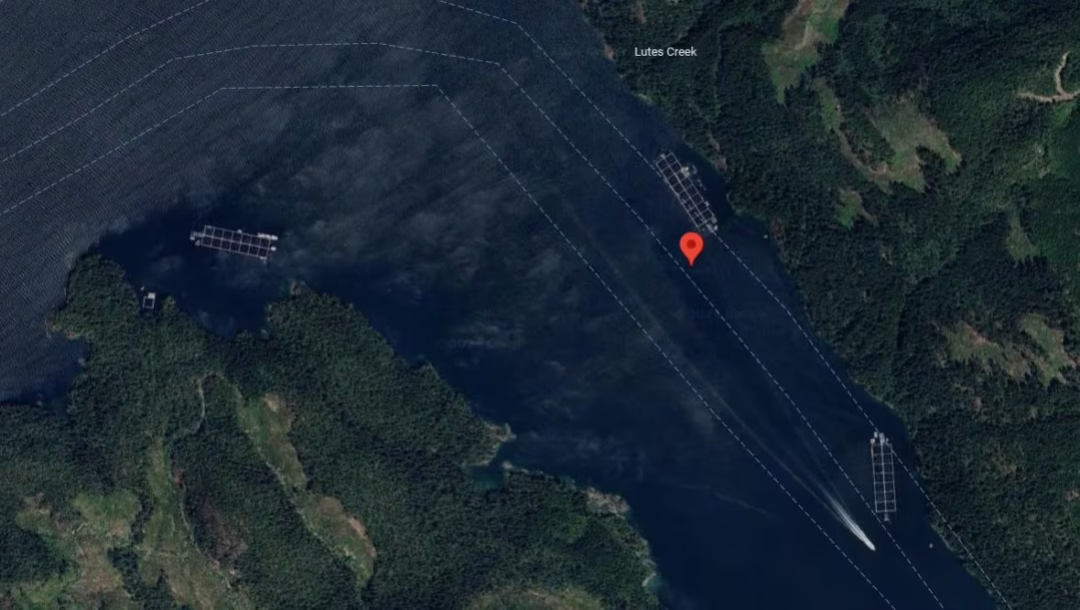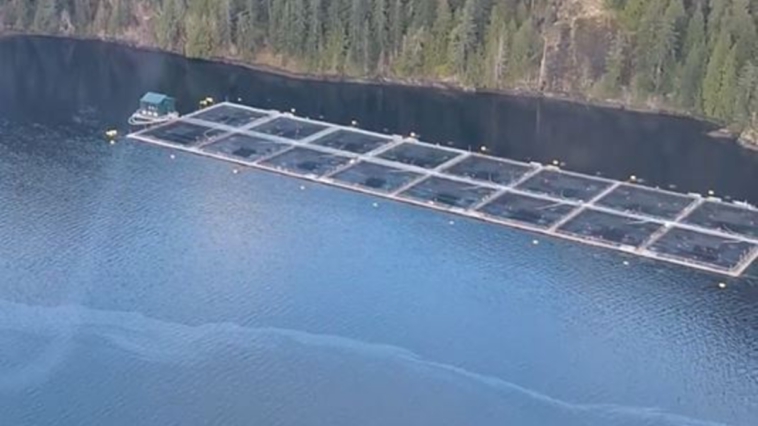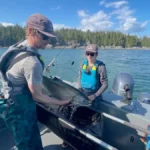A fish farm operated by Norwegian aquaculture company Grieg Seafood has spilled 8,000 litres of diesel fuel at its open-net pen salmon farm near Zeballos, Vancouver Island on Saturday. The company attributed the spill to “human error.”
The Ehattesaht First Nation has issued a clam harvesting alert. The Zeballos Inlet has also been closed off.
“These spills are all too common on the coast of BC and unacceptable in Ehattesaht territory.”
Ehattesaht Chief and Council
The spill occurred at Grieg’s Lutes Creek farm during fuel transferring operations when a transfer pump was not properly shut off. Fish farms use diesel fuel to power work boats, automated feeding systems, and pumps or aerators that maintain water flow and oxygen levels. Additionally, diesel-powered trucks and vessels transport supplies and harvested fish.
Cleanup efforts are currently underway, but according to the Ehattesaht First Nation, the windstorm that occurred over the weekend as well as higher than usual tides will make the initial cleanup difficult. On top of that, cooler temperatures will slow down evaporation and thicken the diesel, making it harder to remove.
Local Nation Responds
“These spills are all too common on the coast of BC and unacceptable in Ehattesaht territory,” the Ehattesaht Chief and Council said in a statement on social media.
Officials from both the Ehattesaht and Nuchatlaht First Nations have made their way to the spill area to assess the situation and lend expertise.
The BC Ministry of Environment and Parks was informed about the spill and deployed aerial and ground surveillance, which identified a visible sheen of fuel on the water spreading out from the site. Ehattesaht Chief and Council confirmed with Ha-Shilth-Sa that “pockets of diesel have travelled up across the channel to Nootka Island and Steamer Point, up Zeballos Inlet and down Esperanza on the north side.”

Grieg Seafood issued a statement, saying they are “looking into our routines, and how we transfer fuel in the future to make sure this does not happen again.” The company also apologized for the “disruption” caused.
Grieg has hired Strategic Natural Resource Consultants (SNRC) to help with the cleanup. SNRC is a BC-based consultancy firm, and their website lists emergency oil spills as one of their specialities. SNRC has placed absorbent booms around the spill area and an incident command post is being set up by the province. No one has been able to recover any usable fuel from the spill.
SNRC is also working with the Ehattesaht First Nation to develop a water and shellfish sampling plan so they can better understand the effects of this oil spill.
“I am sure I will get angry next, but for right now, I am sad that all of this fuel is out there sloshing around our territory, washing up on our beaches. Dealing with this will take a lot of creativity, hard work and some real resources.”
Ehattesaht First Nation Chief Simon John
The Ehattesaht First Nation said in a statement that they will be “issuing some new directives to companies… who handle fuel in the territory.” They will also be reviewing the policies, equipment, and fail-safe systems of the Zeballos and Esperanza fuel docks, as well as the logging camps and fuel delivery trucks in the area.
About 40 people from Grieg Seafood, the provincial government, the Coast Guard, and the Department of Fisheries and Oceans are working on the cleanup.

Speaking to the Times Colonist, Ehattesaht First Nation Chief Simon John expressed how this spill will affect his people, explaining that his nation has harvested food in nearby waters for thousands of years. Therefore, the clam harvesting closure will impact their food security this winter. “I am sure I will get angry next, but for right now, I am sad that all of this fuel is out there sloshing around our territory, washing up on our beaches. Dealing with this will take a lot of creativity, hard work and some real resources,” he said.
According to the Ehattesaht First Nation, the area around Zeballos has seen multiple spills over time, due to abandoned canneries and forestry operations experiencing spills and leaks, leading to long-lasting pollution.
The Environmental Impact of Fish Farms
Grieg Seafood operates 22 fish farms and a hatchery in BC and is licensed to produce 23,400 tonnes of salmon each year.

This is not the first time an oil spill has occurred at a fish farm site in BC. In March 2017, another Norwegian aquaculture company, Cermaq, spilled up to 1,000 litres of biodiesel into the waters of Echo Bay when a fuel pump was left on overnight.
Open-net pen salmon farming has come under fire from scientists and communities for its adverse environmental impact. Waste from fish farms, such as uneaten feed and excrement, introduces excess nitrogen and phosphorus into surrounding waters. This nutrient overload can lead to algal blooms that deplete oxygen levels and harm marine life. On top of that, the use of diesel-powered equipment in fish farming produces 300,000 metric tonnes of carbon dioxide for every million metric tonnes of fish produced, globally.
Additionally, numerous studies have shown that open-net pen salmon farms are hotspots for parasitic salmon lice, which thrive in densely packed farming conditions. Because the farmed salmon are kept in pens that are often near wild salmon migratory routes, the lice spreads to wild salmon populations, leading to higher than usual infection rates. Although debated, the natural infection rate for wild salmon in BC waters is considered to be zero to three lice.
However, a 2020 study found that young sockeye migrating past fish farm in the Queen Charlotte Strait had an average of 26 lice per salmon. The sea lice feed on the skin and flesh of the salmon, inflicting open wounds that lead to viral, bacterial, and fungal infections. The energy expended by the salmon to fight off the lice also makes them more vulnerable to predators and less effective at foraging. Because fish farms contribute to high mortality rates for wild salmon, coastal communities throughout BC have been calling for the permanent closure of all open-net pen fish farms.
The Canadian Coast Guard has issued an advisory warning local mariners to avoid the area.




